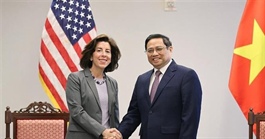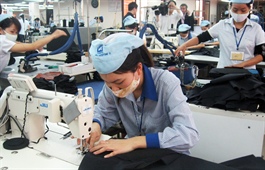Vietnam has choices under new global trends
Vietnam has choices under new global trends
The world today is being affected constantly by the ripple effects of global problems and occurrences such as the ongoing US-China trade war, the recent lengthy Covid-19 pandemic, and now the current fierce Russia-Ukraine conflict.
Illustrative photo. |
This has led to a new consensus from different development economies for the need to reduce dependency on one source and improve integration among various countries.
However, the process of reducing dependency has led to rising inflation, labor shortages, more regional protectionism, and fluctuating shocks in the global financial world. Under such an unpredictable scenario in global trade it would be surprising if countries such as Vietnam will participate in a monetary system that would be chosen for a global trade chain.
New global trends
It was not until the 19th century that global integration began to develop. However, this trend of globalization eventually waned and collapsed during World War I, and was followed by postwar protectionism, the Great Depression, and finally the long and brutal World War II. When World War II ended in the mid-1940s, the United States led the efforts to restore international trade and investment under several set ground rules. Western elitist groups came to believe that increased trade would be the most conducive way to bringing about peace among nations.
Thereby the process of globalization promoted growth and economic prosperity. Figure 1 below shows that the globalization trend promoted both growth and economic openness in the G7 countries and has played a leading role in the process of globalization. However, this process of globalization has been on the decline since the 2007 global financial crisis. Trade shares of world GDP began to decline after 2007, as seen in China's export-to-GDP ratio plummeting by 16 percentage points. In 2007, China's export-to-GDP ratio was 35.43%, which had decreased to 18.5% by 2020. Now even global value chains have stopped expanding and are just moving between countries.
Today, global trade is relegated to secondary status while national goals are being promoted to the top and given most priority, especially in fields of public health and national security. While the globalization goal is to realize a country's comparative advantage, development of globalization creates another principle which is to promote a nation's economic growth, through boosting the economy to produce what richer nations need. As a result, conflict between intervention policies is created.
Today, with China's rise as a geopolitical rival and the sudden and harsh impact of the Russia-Ukraine conflict, the U.S has chosen national security over the interests of international economic cooperation. This exposes global trade to two scenarios. The first is the worst and least desirable scenario of the 1930s when a country or a group of countries withdrew from the production process. The second and likely possibility is that geopolitical supremacy will remain, meaning that trade wars and economic sanctions will become a dominant feature of future global trade and finance.
Choices for Vietnam
The first scenario in global trade will create huge economic losses as major powers are controlling the situation in managing conflicts, hence Vietnam should think about a second scenario. Accordingly, Vietnam should strike a balance between national interests and the requirements of globalization.
This is to say that Vietnam must take advantage of the supply chain shift to attract more investments, promote economic growth from export activities, and accordingly approach the production of goods as per the needs of developed economies. With this strategy, it is inevitable that the adverse effects from global trade activities imposed by major economies will emerge. Therefore, the management of relationships with major countries in global trade is very important in the strategy towards market diversification. It is the first step in creating a balance in international trade between economies to avoid damage caused by unilateral sanctions.
One of the four causes of decline in global trade (Dani Rodrik, 2022), is the problem of income redistribution from the benefits of globalization (Anthea Roberts, Nicolas Lamp, 2021). An important lesson of economic theory is that trade benefits countries when distributional relationships are resolved. One of the saviors of the Vietnamese economy after the fourth wave of the Covid-19 pandemic was export activities. From September 2021 until now, the trade surplus has improved, but whether this area will be supported by economic recovery post-pandemic or from expansion of monetary policy by the banks is still to be seen.


























